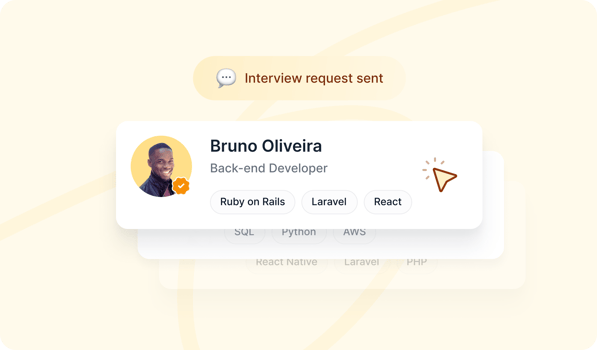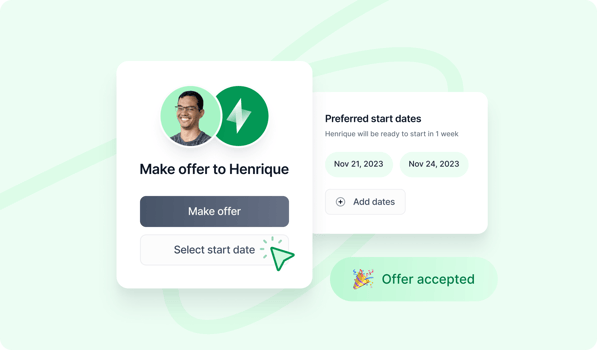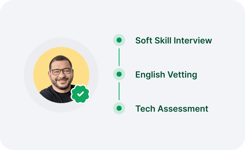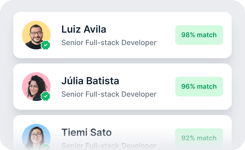How to Hire Great Product Managers? A Guide for Hiring Managers
Product managers are highly skilled professionals who play a critical role in driving the organization's success. They possess a unique blend of business acumen, technical knowledge, and strategic thinking. They collaborate with cross-functional teams, including engineering, design, marketing, and sales, to define product vision, develop roadmaps, and ensure timely delivery of high-quality products.
In today's digital age, remote and freelance options have emerged as valuable resources for hiring product managers. Latin America, in particular, has become a hub for top-notch talent in the tech industry. Leveraging remote and freelance product managers from Latin America offers several advantages like access to a diverse pool of professionals with a deep understanding of global markets, cultural nuances, and industry trends.
Remote hiring enables organizations to tap into this talent pool without geographical limitations, fostering a truly global and collaborative work environment. Furthermore, hiring remote and freelance product managers can offer cost-effective solutions, flexibility, and the opportunity to work with highly skilled professionals who bring fresh perspectives and innovative ideas to the table.
What to look for when hiring Product Managers?
Technical Skills
When hiring a product manager, several technical skills are essential to ensure they can effectively navigate the product development landscape and collaborate with technical teams:
Understanding of Technology
While they don’t need to know how to code, product managers should have a solid understanding of relevant technologies and tools used in the product development process. This includes familiarity with software development methodologies, programming languages, databases, APIs, and other technical components.
Data Analysis and Interpretation
Product managers need to be able to analyze and interpret data to inform product decisions. They should possess skills in data analysis, using tools like Excel, SQL, or data visualization software to extract insights and make data-driven strategic decisions.
UX/UI Knowledge
While not necessarily being a designer, a product manager should have a good understanding of user experience (UX) and user interface (UI) design principles. This knowledge enables them to effectively collaborate with design teams and ensure the product delivers a seamless user experience.
Agile Development Methodologies
Proficiency in agile development methodologies, such as Scrum or Kanban, is crucial. Product managers need to be familiar with these frameworks to effectively manage cross-functional teams, plan sprints, prioritize features, and deliver products iteratively.
Product Development Lifecycle
A strong grasp of the entire product development lifecycle is vital for a product manager. They should understand the various stages, from ideation and requirements gathering to development, testing, and launch, ensuring smooth coordination and timely delivery.
Business Intelligence Tools
Familiarity with business intelligence tools, such as Tableau or Power BI, can be beneficial for product managers. These tools help in visualizing and analyzing business data, creating dashboards, and tracking key performance indicators (KPIs).
By evaluating candidates based on these technical skills, you can ensure that your product manager is equipped to handle the technical aspects of product development, collaborate with technical teams, and make informed decisions throughout the product lifecycle.
Soft Skills
Leadership
Strong leadership qualities to guide cross-functional teams, influence stakeholders, and drive the product vision.
Communication
Excellent verbal and written communication skills to articulate product strategy, collaborate with diverse teams, and effectively engage with customers.
Problem-Solving
Strong problem-solving skills to identify and address challenges, think critically, and find innovative solutions to complex problems.
Collaboration
Ability to collaborate effectively with cross-functional teams, including engineering, design, marketing, and sales, fostering team management and a collaborative and inclusive work environment.
Strategic Thinking
The capability to think strategically, anticipate market trends, and align product roadmap with business objectives.
Specialized Skills:
Domain Expertise
Specialized domain knowledge and experience in a specific industry or market segment, enabling a deep understanding of customer needs and market dynamics.
Product Management Frameworks
Familiarity with popular product management frameworks, such as Lean Startup or Design Thinking, to guide product development and innovation.
Pricing and Monetization Strategies
Knowledge of pricing models, revenue generation strategies, and monetization techniques to maximize product profitability.
UX Research and Testing
Proficiency in conducting user research, usability testing, and gathering user feedback to drive iterative product improvements.
Competitive Analysis
Ability to analyze the competitive landscape, identify market opportunities, and develop strategies to differentiate the product in the market.
Data Privacy and Compliance
Understanding of data privacy regulations and compliance requirements, ensuring products adhere to legal and ethical standards.
Top 5 Product Manager Interview Questions
Can you walk us through your experience with the product development lifecycle and the role you played in each stage?
This question assesses the candidate's understanding of the end-to-end product development process and their ability to navigate different stages.
A good candidate will provide a clear and concise overview, highlighting their contributions in areas like ideation, requirements gathering, design, development, testing, and launch. They should showcase their ability to collaborate with cross-functional teams, prioritize tasks, and ensure timely delivery.
How do you approach gathering and analyzing customer feedback to drive product improvements?
This question evaluates the candidate's customer-centric mindset and their ability to leverage feedback for product enhancements.
A strong candidate will describe a systematic approach to collecting and analyzing customer insights, such as conducting user interviews, surveys, and usability tests. They should emphasize their skills in synthesizing feedback, identifying patterns and trends, and translating them into actionable product improvements.
How do you prioritize features and determine the product roadmap?
This question assesses the candidate's strategic thinking and decision-making abilities.
A good candidate will demonstrate a data-driven approach, considering factors like customer needs, market trends, business goals, and technical feasibility. They should highlight their experience with frameworks like user story mapping or value/effort prioritization. Additionally, they should discuss their communication and negotiation skills in collaborating with stakeholders to align on company priorities.
Tell us about a time when you had to manage a project with tight deadlines and limited resources. How did you handle it?
This question examines the candidate's ability to handle challenging situations and deliver results under pressure.
A strong candidate will share a specific job example, discussing how they assessed the constraints, identified critical paths, and made decisions to optimize resources and meet deadlines. They should showcase their problem-solving skills, adaptability, and effective communication in managing expectations and rallying the team.
How do you keep up with industry trends and stay informed about emerging technologies relevant to our product?
This question evaluates the candidate's proactive approach to staying updated on industry trends and emerging technologies. A good candidate will highlight their methods for continuous learning, such as attending conferences, participating in online communities, reading industry publications, and engaging in professional networks. They should emphasize their ability to translate their knowledge into actionable insights for driving product innovation and competitive advantage.
These interview questions aim to assess a candidate's technical knowledge, problem-solving abilities, strategic thinking, adaptability, and communication skills. A strong candidate will provide detailed and concrete examples from their past experiences, demonstrating their expertise in product management and their potential to contribute effectively to your organization.







